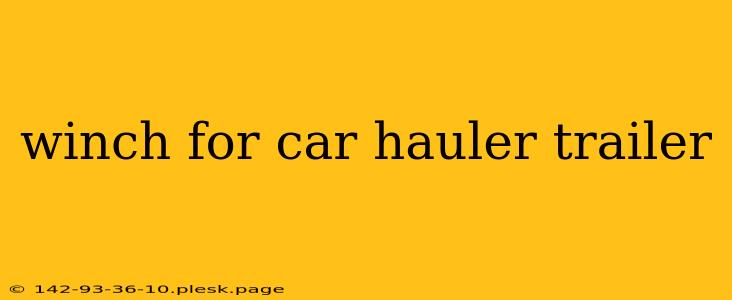Choosing the right winch for your car hauler trailer is crucial for safe and efficient vehicle loading and unloading. This guide will delve into the key factors to consider when selecting a winch, helping you make an informed decision based on your specific needs and budget.
Understanding Winch Types and Their Applications
Several winch types are suitable for car hauler trailers, each with its strengths and weaknesses:
1. Electric Winches:
- Pros: Electric winches offer ease of use, requiring minimal physical exertion. They're generally faster than manual winches and are ideal for heavier vehicles. Remote control options enhance convenience and safety.
- Cons: They require a power source (typically a 12V battery) and are more expensive than manual winches. They can also be susceptible to damage from water or dust. Consider the amperage draw—an insufficiently powerful battery can lead to issues.
2. Manual Winches:
- Pros: Manual winches are significantly cheaper and require no power source. They are reliable and simple to maintain.
- Cons: They require considerable physical strength, making them less suitable for heavier vehicles or frequent use. The process is slower and more laborious compared to electric winches.
3. Hydraulic Winches:
- Pros: Hydraulic winches are incredibly powerful and suitable for extremely heavy vehicles. They provide smooth, controlled operation.
- Cons: They are the most expensive option and require a hydraulic system to operate, adding significant complexity and cost to the setup.
Key Factors to Consider When Choosing a Winch
Several crucial factors determine the right winch for your car hauler trailer:
1. Weight Capacity:
This is arguably the most important factor. The winch's rated capacity must exceed the combined weight of the heaviest vehicle you intend to haul, plus a significant safety margin (at least 20%). Overloading a winch can lead to catastrophic failure.
2. Line Speed and Drum Capacity:
Line speed refers to how quickly the cable winds or unwinds. Faster line speeds are more convenient but often come with a trade-off in pulling power. Drum capacity determines how much cable the winch can hold—ensure it's sufficient for your needs.
3. Mounting and Installation:
Check for compatibility with your trailer's frame and mounting points. Some winches require custom fabrication for installation. Consider the winch's overall dimensions to ensure adequate clearance.
4. Power Source (for Electric Winches):
Ensure your vehicle's battery can handle the winch's amperage draw. A low battery voltage can damage the winch or leave you stranded. Consider adding a dedicated deep-cycle battery for reliable operation.
5. Safety Features:
Look for winches with features such as an automatic brake, overload protection, and a durable, high-quality cable. Regular inspection and maintenance are crucial for safe operation.
Maintenance and Safety Precautions
Regardless of the winch type, regular maintenance is vital:
- Inspect the cable for fraying or damage: Replace it immediately if any issues are found.
- Lubricate moving parts: This prevents wear and tear and ensures smooth operation.
- Check the winch's mounting bolts: Ensure they are tight and secure.
- Test the winch's functionality regularly: This allows for early detection of potential problems.
Always follow the manufacturer's instructions for safe operation and never exceed the winch's rated capacity. Using a winch improperly can lead to serious injury or damage.
This comprehensive guide provides a solid foundation for selecting the appropriate winch for your car hauler trailer. Remember to prioritize safety and select a winch that meets your specific needs and budget. Prioritize safety above all else when using a winch.

